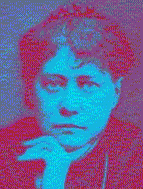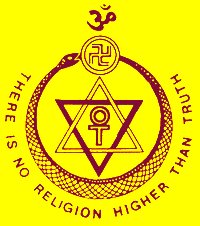The Key to Theosophy

_______________________
The Key to Theosophy
By
Definite Words for
Definite Things
Q. Don't you
think it is because there are no definite and fixed terms to indicate each
principle in man, that such a confusion of ideas
arises in our minds with respect to the respective functions of these
principles?
A. I have
thought of it myself. The whole trouble has arisen from this: we have started
our expositions of, and discussion about, the principles, using their Sanskrit
names instead of coining immediately, for the use of Theosophists, their
equivalents in English. We must try and remedy this now.
Q. You will
do well, as it may avoid further confusion; no two Theosophical writers, it
seems to me, have hitherto agreed to call the same principle by the same name.
A. The confusion is more apparent than real, however. I have
heard some of our Theosophists express surprise at, and criticize several
essays speaking of these principles; but, when examined, there was no worse
mistake in them than that of using the word Soul to cover the three principles
without specifying the distinctions. The first, as positively the clearest of
our Theosophical writers, Mr. A.P. Sinnett, has some comprehensive and
admirably-written passages on the "Higher Self." His real idea has
also been misconceived by some, owing to his using the word Soul in a general
sense. Yet here are a few passages which will show to you how clear and
comprehensive is all that he writes on the subject:
The human
soul, once launched on the streams of evolution as a human individuality,
passes through alternate periods of physical and relatively spiritual
existence. It passes from the one plane, or stratum, or condition of nature to
the other under the guidance of its Karmic affinities; living in incarnations
the life which its Karma has preordained; modifying its progress within the
limitations of circumstances, and-developing fresh Karma by its use or abuse of
opportunities-it returns to spiritual existence (Devachan) after each physical
life-through the intervening region of Kamaloka-for rest and refreshment and
for the gradual absorption into its essence, as so much cosmic progress, of the
life's experience gained "on earth" or during physical existence.
This view of
the matter will, moreover, have suggested many collateral inferences to anyone
thinking over the subject; for instance, that the transfer of consciousness
from the Kamaloka to the Devachanic stage of this progression would necessarily
be gradual; that in truth, no hard-and-fast line separates the varieties of
spiritual conditions, that even the spiritual and physical planes, as psychic
faculties in living people show, are not so hopelessly walled off from one
another as materialistic theories would suggest; that all states of nature are
all around us simultaneously, and appeal to different perceptive faculties; and
so on … It is clear that during physical existence people who possess psychic
faculties remain in connection with the planes of super-physical consciousness;
and although most people may not be endowed with such faculties, we all, as the
phenomena of sleep, even, and especially … those of somnambulism or mesmerism,
show, are capable of entering into conditions of consciousness that the five
physical senses have nothing to do with. We-the souls within us-are not as it were altogether adrift in the ocean of matter. We clearly
retain some surviving interest or rights in the shore from which, for a time,
we have floated off. The process of incarnation, therefore,
is not fully described when we speak of an alternate existence on the physical
and spiritual planes, and thus picture the soul as a complete entity
slipping entirely from the one state of existence to the other. The more
correct definitions of the process would probably represent incarnation as
taking place on this physical plane of nature by reason of an efflux emanating
from the soul.
The Spiritual
realm would all the while be the proper habitat of the Soul, which would never
entirely quit it; and that non-materializable portion
of the Soul which abides permanently on the spiritual plane may fitly, perhaps,
be spoken of as the Higher Self.
This
"Higher Self" is Atma, and of course it is "non-materializable," as Mr. Sinnett says. Even more, it
can never be "objective" under any circumstances, even to the highest
spiritual perception. For Atma or the "Higher Self"
is really Brahma, the Absolute, and indistinguishable from it. In hours
of Samadhi, the higher spiritual consciousness of the Initiate is entirely
absorbed in the one essence, which is Atma, and therefore, being one with the
whole, there can be nothing objective for it. Now some of our Theosophists have
got into the habit of using the words Self and Ego as synonymous, of
associating the term Self with only man's higher individual or even personal
"Self" or Ego,whereas this term ought never
to be applied except to the One universal Self. Hence the
confusion. Speaking of Manas, the "causal body," we may call
it-when connecting it with the Buddhic radiance-the "Higher Ego,"
never the "Higher Self." For even Buddhi, the "Spiritual
Soul," is not the Self, but the vehicle only of Self.
All the other "Selves"-such as the "Individual" self and
"personal" self-ought never to be spoken or written of without their
qualifying and characteristic adjectives.
Thus in this
most excellent essay on the "Higher Self," this term is applied to
the sixth principleor Buddhi; and has in consequence
given rise to just such misunderstandings. The statement thatA
child does not acquire its sixth principle-or become a morally responsible
being capable of generating Karma-until seven years old.-proves what is meant
therein by the Higher Self. Therefore, the able author is quite justified in
explaining that after the "Higher Self" has passed into the human
being and saturated the personality-in some of the finer organizations
only-with its consciousness People with psychic faculties may indeed perceive
this Higher Self through their finer senses from time to time.
But so are
those, who limit the term Higher Selfto the Universal
Divine Principle, "justified" in misunderstanding him. For, when we
read, without being prepared for this shifting of metaphysical terms, that
while Fully manifesting on the physical plane … the Higher Self still remains a
conscious spiritual Ego on the corresponding plane of Nature.
We are apt to
see in the "Higher Self" of this sentence, Atma, and in the spiritual
Ego, Manas,or rather
Buddhi-Manas, and forthwith to criticize the whole thing as incorrect.
To avoid
henceforth such misapprehensions, I propose to translate literally from the
Occult Eastern terms their equivalents in English, and offer these for future
use.
[The Self and the Egos ]
The Higher
Self is Atma, the inseparable ray of the Universal and One Self. It is the God
above, more than within, us. Happy the man who succeeds in saturating his inner
Ego with it!
The Spiritual
divine Ego is the Spiritual soul or Buddhi, in close union with Manas, the
mind-principle, without which it is no Ego at all, but only the Atmic Vehicle.
The Inner, or
Higher "Ego" is Manas,the
"Fifth" Principle, so-called, independently of Buddhi. The
Mind-Principle is only the Spiritual Ego when merged into one with Buddhi-no
materialist being supposed to have in himsuch an Ego,
however great his intellectual capacities. It is the permanent Individuality or
the "Reincarnating Ego."
The Lower, or
Personal "Ego" is the physical man in conjunction with his lower
Self, i.e., animal instincts, passions, desires, etc. It is called the
"false personality," and consists of the lower Manas combined with
Kamarupa, and operating through the Physical body and its phantom or
"double."
The remaining
principle Prana, or Life, is, strictly speaking, the radiating force or Energy
of Atma-as the Universal Life and the One Self-Its lower or rather (in its
effects) more physical, because manifesting, aspect. Prana or Life permeates
the whole being of the objective Universe; and is called a principle only
because it is an indispensable factor and the deus ex
machina of the living man.
Q. This
division being so much simplified in its combinations will answer better, I
believe. The other is much too metaphysical.
A. If
outsiders as well as Theosophists would agree to it, it would certainly make
matters much more comprehensible.
__________________________

Find answers to more questions
with
these Theosophy links
Dave’s
Streetwise Theosophy Boards
The Theosophy Website that
Welcomes Absolute Beginners
If you run a Theosophy Study Group,
please feel free
to make use of the
material on this Website
The Most Basic Theosophy
Website in the Universe
A quick overview of Theosophy
and the Theosophical Society
If you run a Theosophy Study Group you
can use this as an introductory handout.

Cardiff Theosophical Society meetings
are informal
and there’s always a cup of tea afterwards
The
Cardiff Theosophical Society Website
The
National Wales Theosophy Website
This is for
everybody not just people in Wales
Theosophy Cardiff’s Instant Guide
General pages
about Wales, Welsh History
and The History of
Theosophy in Wales
Independent Theosophy Blog
One liners and quick explanations
About aspects of Theosophy
H P Blavatsky is usually the only
Theosophist that most people have
ever
heard of. Let’s put
that right
Lentil burgers, a
thousand press ups before breakfast and
the daily 25 mile
run may put it off for a while but death
seems to get most of
us in the end. We are pleased to
present for your
consideration, a definitive work on the
subject by a Student of
Katherine Tingley entitled
An
Independent Theosophical Republic
Links to Free Online Theosophy
Study Resources; Courses, Writings,
No
Aardvarks were harmed in the
The Spiritual Home of Urban Theosophy
The Earth Base for Evolutionary Theosophy
Classic Introductory
Theosophy Text
A Text Book of Theosophy By C
What Theosophy Is From the Absolute to Man
The Formation of a Solar System The Evolution of Life
The Constitution of Man After Death Reincarnation
The Purpose of Life The Planetary Chains
The Result of Theosophical Study
An Outstanding
Introduction to Theosophy
By a student of
Katherine Tingley
Elementary Theosophy Who is the Man? Body and Soul
Body, Soul and Spirit Reincarnation Karma
Preface
Theosophy and the Masters General Principles
The Earth Chain Body and Astral Body Kama – Desire
Manas Of
Reincarnation Reincarnation Continued
Karma Kama Loka
Devachan
Cycles
Arguments Supporting Reincarnation
Differentiation Of Species Missing Links
Psychic Laws, Forces, and Phenomena
Psychic Phenomena and Spiritualism
Quick Explanations with Links to More
Detailed Info
What is Theosophy ? Theosophy Defined (More Detail)
Three Fundamental Propositions Key Concepts of Theosophy
Cosmogenesis
Anthropogenesis
Root Races
Karma
Ascended Masters After Death States
Reincarnation
The Seven Principles of Man Helena Petrovna Blavatsky
Colonel Henry Steel Olcott William Quan Judge
The Start of the Theosophical Society Theosophical Society Presidents
History of the Theosophical Society Glossaries of Theosophical Terms
History of the Theosophical Society in Wales
The Three Objectives of the Theosophical Society
Explanation of the Theosophical Society Emblem
Karma Fundamental Principles Laws: Natural and Man-Made The Law of Laws
The Eternal Now
Succession
Causation The Laws of Nature A Lesson of The Law
Karma Does Not Crush Apply This Law
Man in The Three Worlds Understand The Truth
Man and His Surroundings The Three Fates The Pair of Triplets Thought, The Builder
Practical Meditation Will and Desire
The Mastery of Desire Two Other Points
The Third Thread Perfect Justice
Our Environment
Our Kith and Kin Our Nation
The Light for a Good Man Knowledge of Law The Opposing Schools
The More Modern View Self-Examination Out of the Past
Old Friendships
We Grow By Giving Collective Karma Family Karma
National Karma
India’s Karma
National Disasters
Try these if you are looking
for a
local Theosophy Group or Centre
UK Listing of Theosophical Groups